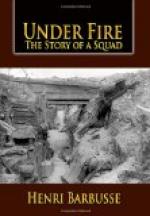“Ah, the Devil!”
A gleam of Paradise lost lights up their eyes and seems even to redden their cold faces.
“Talk about a festival!” sighs Tirloir, as he leaves off scratching himself, and looks pensively far away over Trenchland.
“Ah, nom de Dieu! All that town, nearly abandoned, that used to be ours! The houses and the beds—”
“And the cupboards!”
“And the cellars!”
Lamuse’s eyes are wet, his face like a nosegay, his heart full.
“Were you there long?” asks Cadilhac, who came here later, with the drafts from Auvergne.
“Several months.”
The conversation had almost died out, but it flames up again fiercely at this vision of the days of plenty.
“We used to see,” said Paradis dreamily, “the poilus pouring along and behind the houses on the way back to camp with fowls hung round their middles, and a rabbit under each arm, borrowed from some good fellow or woman that they hadn’t seen and won’t ever see again.”
We reflect on the far-off flavor of chicken and rabbit. “There were things that we paid for, too. The spondu-licks just danced about. We held all the aces in those days.”
“A hundred thousand francs went rolling round the shops.”
“Millions, oui. All the day, just a squandering that you’ve no idea of, a sort of devil’s delight.”
“Believe me or not,” said Blaire to Cadilhac, “but in the middle of it all, what we had the least of was fires, just like here and everywhere else you go. You had to chase it and find it and stick to it. Ah, mon vieux, how we did run after the kindlings!”
“Well, we were in the camp of the C.H.R. The cook there was the great Martin Cesar. He was the man for finding wood!”
“Ah, oui, oui! He was the ace of trumps! He got what he wanted without twisting himself.”
“Always some fire in his kitchen, young fellow. You saw cooks chasing and gabbling about the streets in all directions, blubbering because they had no coal or wood. But he’d got a fire. When he hadn’t any, he said, ‘Don’t worry, I’ll see you through.’ And he wasn’t long about it, either.”
“He went a bit too far, even. The first time I saw him in his kitchen, you’d never guess what he’d got the stew going with! With a violin that he’d found in the house!”
“Rotten, all the same,” says Mesnil Andre. “One knows well enough that a violin isn’t worth much when it comes to utility, but all the same—”
“Other times, he used billiard cues. Zizi just succeeded in pinching one for a cane, but the rest—into the fire! Then the arm-chairs in the drawing-room went by degrees—mahogany, they were. He did ’em in and cut them up by night, case some N.C.O. had something to say about it.”
“He knew his way about,” said Pepin. “As for us, we got busy with an old suite of furniture that lasted us a fortnight.”




